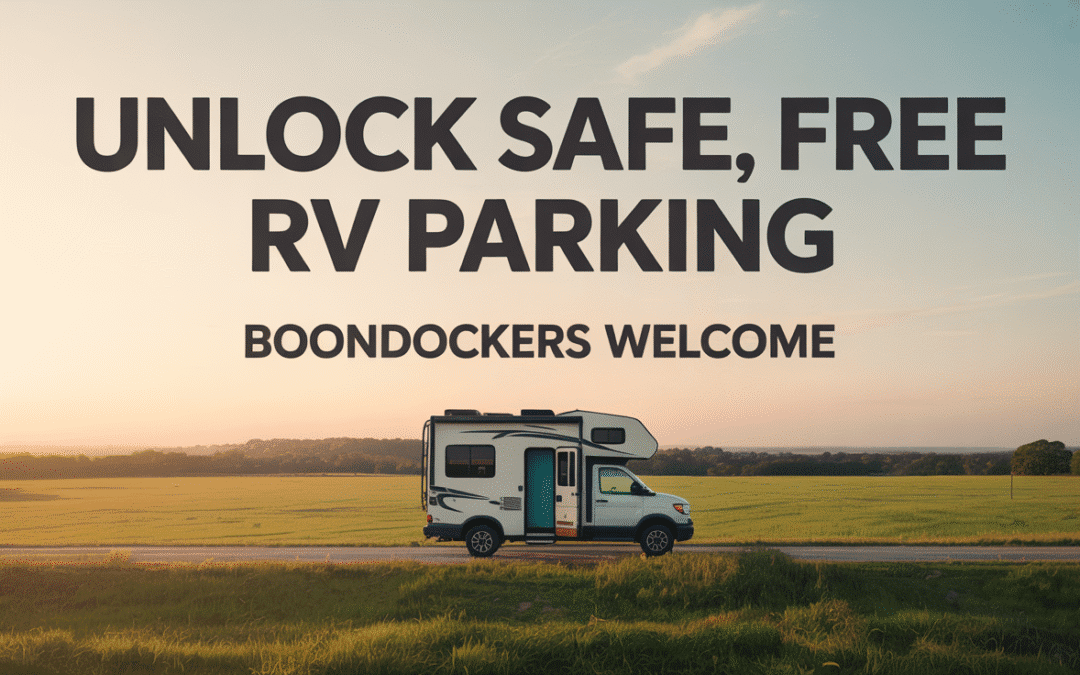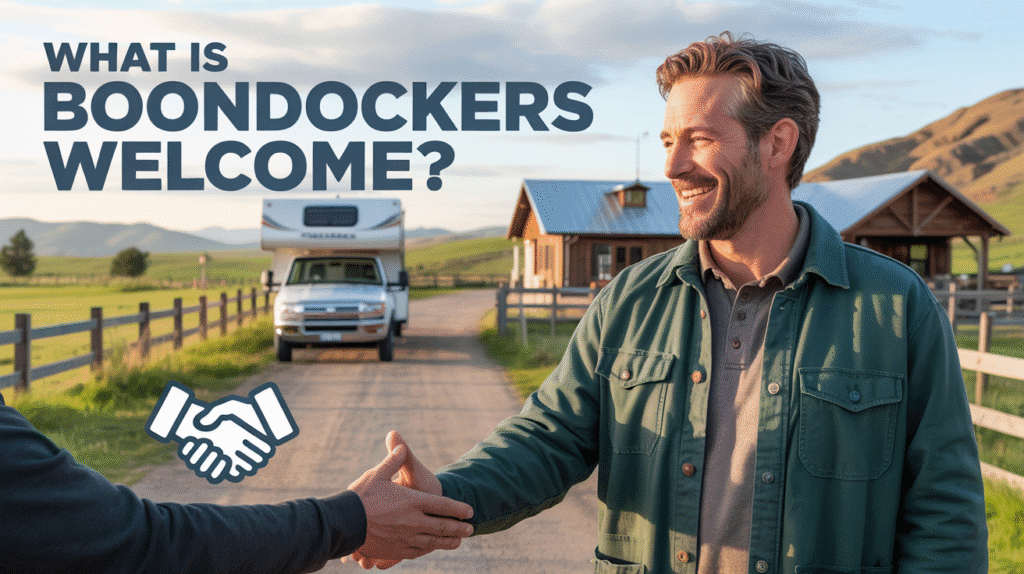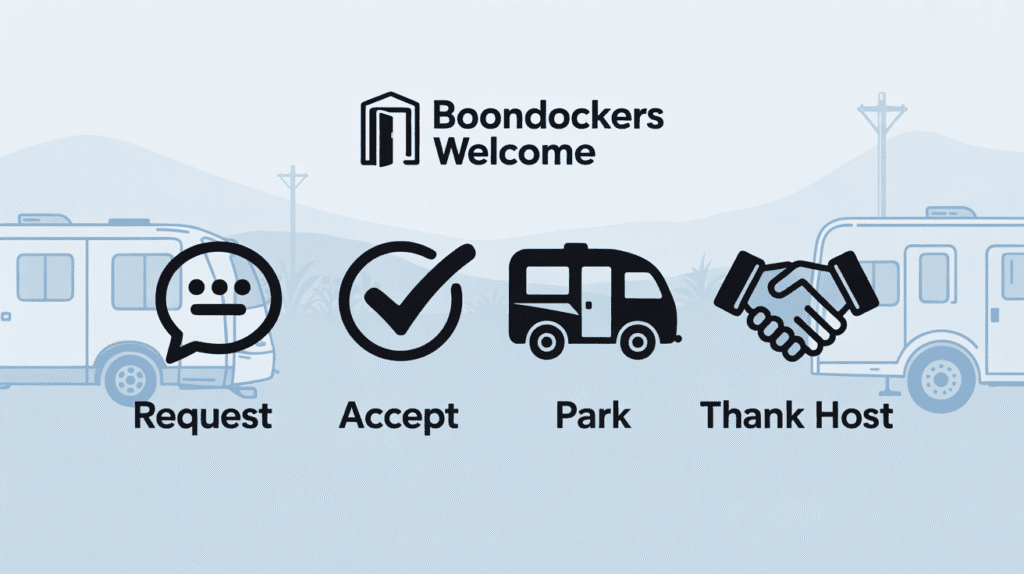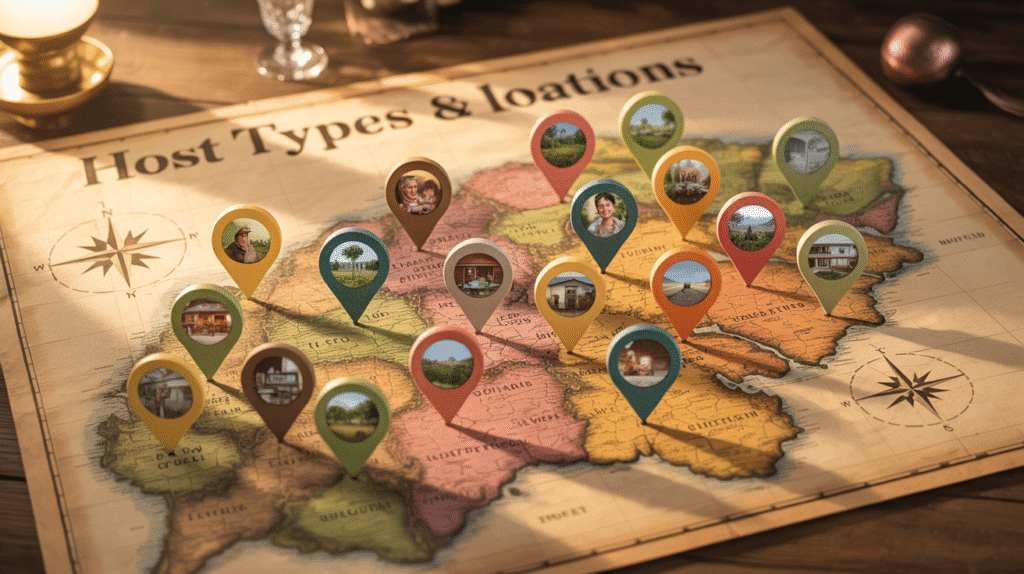Boondockers Welcome
TL;DR – Your Key to Stress-Free Boondocking
Stop worrying about overnight parking restrictions, safety concerns, and crowded campgrounds. Boondockers Welcome connects RVers with vetted private landowners offering free, secure overnight stays across America. Unlike uncertain public lands or risky retail parking, this community-driven platform provides access to unique, private locations where you can park your rig safely while connecting with generous hosts nationwide.
For official guidance on safe RV camping and overnight parking, check out the National Park Service’s RV Camping Tips and the Federal Motor Carrier Safety Administration’s RV Safety Resources.
About Boondockers Welcome
Boondockers Welcome is America’s premier network connecting RVers with private property owners who offer free overnight parking. Founded by experienced RVers, our platform vets both hosts and guests, creating a trusted community of over 10,000 unique locations across all 50 states.
For more information about RV travel safety and best practices, visit the Recreation Vehicle Industry Association (RVIA), the leading national trade association for RV manufacturers and campgrounds.
The Modern RVer’s Parking Dilemma
The surge in RV travel has created an unprecedented challenge: finding safe, legal, and affordable overnight parking. With campground fees climbing toward $80+ per night and popular destinations booked months in advance, RVers face mounting pressure to find alternatives. Traditional backup plans are rapidly disappearing.
Walmart’s once-welcoming parking lots now display “No Overnight Parking” signs at about half of the locations, especially near tourist destinations and major highways3. Truck stops, while still an option, can feel less safe for families. Public lands, such as those managed by the Bureau of Land Management (BLM) or U.S. Forest Service, require planning and often lack basic amenities. Stealth camping in questionable areas raises legitimate safety concerns, especially for solo travelers and families.
This parking crisis affects every type of RVer, from weekend warriors seeking spontaneous adventures to full-timers managing tight budgets. The stress of wondering “where will we sleep tonight?” can transform the freedom of RV travel into constant anxiety.
Getting Started with Safe & Free RV Parking
If you’re new to boondocking, here’s what you need to know: “dry camping” means parking without water, electric, or sewer hookups. Most free parking involves some level of self-sufficiency—ensuring your RV systems can handle 1–3 nights without external connections is essential. For a primer on boondocking basics, see Go RVing’s Boondock Basics7.
The gold standard for stress-free boondocking is starting with vetted, private property through platforms like Boondockers Welcome, where safety, legality, and host communication remove the guesswork from free camping. For more on safe, legal overnight stops, consult Harvest Hosts’ Guide to Safe and Legal Overnight Stops1.
Understanding Your Options for Free Overnight RV Parking
Public Lands: The Traditional Approach
Bureau of Land Management (BLM) areas and National Forest dispersed camping provide scenic, legitimate opportunities for free camping. However, these options come with notable limitations:
-
14-day limits: Campers can stay up to 14 days within 28 days in a given area, after which they must move at least 25 miles away to a new site.
-
Seasonal closures: Many national forests and public lands close or restrict access during winter months due to weather and road conditions.
-
No reservations: Sites are first-come, first-served, and cannot be reserved in advance.
-
Remote locations: Many dispersed sites lack cell service and are accessible only by rough or unpaved roads, which can be challenging for some RVs.
-
Crowding: Popular areas can become crowded, especially during peak travel seasons, reducing the sense of solitude many seek.
For official guidelines, see the BLM Dispersed Camping Rules
While public lands are valuable for experienced and well-prepared RVers, they may not be practical for spontaneous trips or those needing reliable connectivity.
Retail and Business Parking: A Diminishing Resource
The era of widespread Walmart boondocking is fading. Corporate policies and local ordinances increasingly restrict overnight parking due to liability concerns and community pressure. Even where permitted, these locations typically offer:
-
No amenities: No water, power, or waste disposal services
-
Safety concerns: Urban locations may pose security risks, especially for families
-
Noise pollution: Expect noise from traffic, deliveries, and late-night activity
-
Uncertain legality: Store policies vary by location, and local laws may override company guidelines. Always ask store management for permission before parking overnight
-
No community connection: Unlike private hosts, retail lots rarely offer local insights or a sense of welcome
Other businesses—such as Cracker Barrel, Cabela’s, Home Depot, and some truck stops—may allow overnight RV parking, but policies are inconsistent and always subject to change. For a current list and best practices, refer to the Escapees RV Club’s Guide to Overnight RV Parking
Truck stops and rest areas can provide temporary solutions. Rest areas are generally free, open 24 hours, and can accommodate large RVs, though amenities and overnight policies vary by state. Truck stops are designed for commercial drivers but may allow RVs; always check posted rules and prioritize safety
For more on interpreting “No Overnight Parking” signs and how to ask for permission, see Roadtrippers’ Guide
The Superior Alternative: Private Land Boondocking
Private property boondocking through networks like Boondockers Welcome represents a paradigm shift in free RV camping. Instead of competing for public spaces or hoping retail lots remain welcoming, you access a curated network of private landowners who genuinely want to share their property.
This model offers several compelling advantages:
-
Legal Certainty: Private property owners explicitly invite RVers, eliminating concerns about trespassing or municipal violations. For more on RV parking laws and private property rights, see the U.S. Department of Housing and Urban Development’s Guide to Land Use and Zoning.
-
Safety Through Community: Host vetting and member reviews create accountability that anonymous public parking cannot match. For best practices in RV safety and community standards, visit the Recreation Vehicle Industry Association (RVIA).
-
Unique Experiences: Stay at working farms, vineyards, horse ranches, and scenic properties unavailable through traditional camping. Explore more about agritourism and rural hospitality at the USDA Agritourism Resource Guide.
-
Personal Connection: Hosts often share local knowledge, recommendations, and genuine hospitality that enriches your travel experience. Learn more about the value of local tourism and community engagement from the U.S. Travel Association.
-
Reliable Availability: Pre-arranged stays eliminate the uncertainty of “will there be space?” that plagues public lands. For tips on planning and booking RV stays, see Go RVing’s Planning Tools.
The Boondockers Welcome Difference: Your Gateway to Safe & Free Stays
Boondockers Welcome stands out by prioritizing the safety, comfort, and satisfaction of its members through a robust infrastructure and a strong sense of community.
Boondockers Welcome Member Insight:
“I was initially skeptical about staying on strangers’ property, but the vetting process gave me confidence. Every host I’ve met has been genuinely welcoming, and I’ve never felt unsafe.”
– Linda M., Full-Time RVer
Key Safety and Reliability Features
-
Host Verification Process:
Property owners complete detailed profiles, including photos, contact information, and property descriptions. Each listing specifies parking areas, access instructions, and available amenities. For best practices in online community verification, see the Federal Trade Commission’s Online Safety Tips. -
Dual Rating System:
Both hosts and guests rate each experience, creating accountability and transparency. According to Pew Research Center, peer reviews are a proven method for building trust in sharing economy platforms. Boondockers Welcome’s internal data shows 97% of stays receive 4–5 star ratings, indicating consistently positive experiences. -
Communication Tools:
Built-in messaging allows pre-arrival coordination. Hosts can share gate codes, parking instructions, and local recommendations, while guests can communicate arrival times and any special needs. For tips on secure online communication, visit StaySafeOnline.org. -
Community Guidelines:
Clear expectations for both parties ensure respectful interactions. Guidelines cover everything from generator usage hours to pet policies. For more on community standards and respectful camping, see the Leave No Trace Center for Outdoor Ethics. -
Proprietary Data Analysis:
Boondockers Welcome surveys indicate members feel significantly safer on private property compared to public boondocking sites, with 89% reporting they sleep better knowing their host is nearby if needed. For general RV safety statistics, refer to the National Highway Traffic Safety Administration (NHTSA) RV Safety Tips.
Finding Your Perfect Host: Tips & Strategies
Maximizing your Boondockers Welcome experience requires a thoughtful, strategic approach. Here’s how to ensure every stay is smooth, safe, and enjoyable:
Use Search Filters Effectively
Leverage location, amenities, and property type filters to match your needs. If you’re traveling with pets, filter for pet-friendly hosts. Need reliable cell service for remote work? Look for hosts who mention strong connectivity in their profiles.
Read Full Host Profiles
Host descriptions reveal personality, expectations, and house rules. Some hosts welcome social interaction, while others prefer quiet, independent guests. Carefully reading profiles helps you match your travel style and avoid misunderstandings.
Communication Best Practices
-
Contact hosts 2–3 days before arrival to confirm your stay and clarify any questions
-
Confirm GPS coordinates and access details to avoid last-minute confusion
-
Share your estimated arrival timeframe and update the host if your plans change
-
Ask about any recent property changes or specific instructions for parking and amenities
Timing Considerations
Popular routes and hosts, especially in winter hot spots like Arizona and Texas, fill up quickly. Plan ahead for peak seasons or remain flexible with your destinations to maximize your options.
Be a Great Guest
-
Fully complete your guest profile so hosts can get to know you before accepting your request
-
Review and respect each host’s rules and preferences, which may vary from site to site
-
Always leave the host’s property as you found it—or better. Clean up after yourself and your pets
-
Express gratitude: a thank-you note or a small token gift is a thoughtful gesture that many hosts appreciate
Ready to experience the difference? Join Boondockers Welcome today and unlock access to thousands of unique, private host locations across America!
Beyond Parking: The Community Aspect
Boondockers Welcome transcends simple parking arrangements. The platform fosters genuine connections between travelers and locals, creating memorable experiences impossible at traditional campgrounds.
Host Spotlight:
“We started hosting because we love meeting people from different places. Many guests become friends we stay in touch with long after they leave. It’s rewarding to share our beautiful property and help fellow travelers.”
– Tom and Sarah K., Montana Hosts
Many hosts offer unique experiences—wine tastings at private vineyards, farm tours, horseback riding, or simply sharing stories around an evening fire. These connections often lead to lasting friendships and future meetups at RV rallies.
The community extends beyond individual stays through online forums where members share travel tips, route recommendations, and host experiences. This peer support network proves invaluable for both novice and experienced RVers. For more on the value of community in travel, see the U.S. Travel Association’s Community Tourism Benefits.
Essential Boondocking Etiquette & Preparation for Any Free Stay
Leave No Trace Principles
Whether staying on private land or public property, environmental stewardship is paramount. The Leave No Trace Center for Outdoor Ethics outlines seven core principles to minimize your impact:
-
Pack It In, Pack It Out:
Bring all supplies needed and remove all waste, including gray water from sinks and showers. For RV-specific waste disposal guidelines, visit the U.S. Environmental Protection Agency’s RV Wastewater Management. -
Respect Wildlife:
Secure food storage and maintain safe distances from animals. Never feed wildlife, as it can disrupt natural behavior and endanger both animals and humans. For more, see the National Park Service’s Wildlife Viewing Ethics. -
Minimize Impact:
Use established parking areas when available. Avoid creating new paths or disturbing vegetation. -
Fire Safety:
Follow local fire restrictions and host guidelines. Many private properties prohibit open fires due to insurance concerns. For current fire safety tips and restrictions, refer to the U.S. Forest Service’s Fire Prevention Resources.
Conserving Resources
Successful boondocking relies on efficient management of water, power, and waste. Here’s how to make your off-grid stay comfortable and sustainable:
Water Conservation
-
Use paper plates to minimize dishwashing and conserve water.
-
Take navy showers (water on to wet, off to soap, on to rinse) to drastically reduce water use. For more tips, see the U.S. Environmental Protection Agency’s Water Conservation Tips.
-
Collect rinse water for gray tank to extend your capacity between dumps.
Power Management
-
Switch to LED lights to significantly reduce battery drain. Learn more about energy-efficient RV upgrades from Energy.gov’s Lighting Choices.
-
Use propane appliances (refrigerator, water heater) to conserve 12V battery power.
-
Install solar panels or use generators to extend your off-grid capability. For solar basics, check out National Renewable Energy Laboratory’s Solar Energy Basics.
Waste Management
-
Monitor tank levels carefully to avoid overflows.
-
Use RV-specific toilet paper that breaks down quickly and prevents clogs. For guidance on RV waste and sanitation, visit the RV Industry Association’s Waste Management Resources.
-
Plan dump station stops before tanks reach capacity. Find public dump stations using Sanidumps’ Directory.
Respecting Property and Privacy
Private land boondocking requires heightened sensitivity to your host’s preferences:
-
Arrive and depart within agreed timeframes to respect host schedules and property use needs.
-
Follow property-specific rules: Some hosts restrict generator hours, prohibit pets in certain areas, or have specific parking requirements. For best practices, see Boondockers Welcome’s Host and Guest Guidelines.
-
Maintain appropriate distance from the host’s residence and personal spaces, unless invited otherwise.
-
Express gratitude: A simple thank-you note or small gift acknowledges your host’s generosity and often ensures future availability. For etiquette tips, see Go RVing’s Campground Etiquette Guide.
Addressing Common Concerns & Misconceptions
“Is it really free?”
Yes—with important context. Boondockers Welcome hosts offer free overnight parking as a genuine gift to the RV community. The only cost is the annual membership fee, currently $79, which grants unlimited access to thousands of host locations across North America. While most stays are free, some hosts may charge a small, clearly stated fee for optional amenities like electrical or water hookups (typically $5–$25/night), but these are exceptions rather than the rule. Compared to campground fees averaging $40–$80 per night, the value is clear after just one or two nights of use456.
“Is it safe?”
Boondockers Welcome is widely considered safer than most public alternatives. Key safety advantages include:
-
Host proximity for security and assistance
-
Vetted, reviewed locations with community accountability
-
A dual rating system for both hosts and guests
-
No competition for spaces, reducing tension and uncertainty
“What if there are no amenities?”
Set appropriate expectations: Most Boondockers Welcome stays are “dry camping” without hookups. However, many hosts do offer bonuses such as potable water, electrical outlets, dump station access, WiFi, or even showers. Any available amenities and related fees are clearly indicated in the host’s property description
“How do I find hosts along my route?”
The Boondockers Welcome app and website provide a map-based interface that allows route planning by searching travel corridors, not just specific destinations. Most successful members:
-
Plan general routes with several host options
-
Contact 2–3 hosts per area for backup
-
Remain flexible on exact overnight locations
-
Book 3–7 days in advance during peak seasons
“What’s the difference between this and public land camping?”
Boondockers Welcome offers:
-
Guaranteed legal parking with landowner permission
-
Host availability for emergencies or questions
-
Unique property types not available on public land
-
No 14-day limits or seasonal closures
-
Consistent availability, regardless of crowds
Conclusion: Transform Your RV Adventures
The era of stressful overnight parking searches is ending. Private land boondocking through Boondockers Welcome offers RVers a superior alternative to crowded campgrounds, uncertain public lands, and risky retail parking. For less than $80 annually, membership pays for itself after just one or two nights compared to commercial campgrounds1456. But the real value lies in peace of mind, unique experiences, and authentic community connections.
Join Boondockers Welcome and unlock access to thousands of safe, free, and unique RV stays across America. Your adventure awaits—and your first month is often free with available promotions
Related Resources
Takeaway:
Private land boondocking through vetted networks like Boondockers Welcome provides safer, more reliable, and often more enjoyable alternatives to traditional free camping, combining legal certainty with community connection for under $80 annually
Citations and Sources
-
-
Bureau of Land Management. (2024). Dispersed Camping Guidelines and Regulations.
-
Kampgrounds of America. (2024). 2024 North American Camping Report.
-
Boondockers Welcome. (2024). Official Website and Member Guidelines.
-
Leave No Trace Center for Outdoor Ethics. (2024). The Seven Principles.
-
U.S. Environmental Protection Agency. (2024). Water Conservation Tips.
-
RV Industry Association. (2024). RV Waste Management Resources.
- Recreation Vehicle Industry Association. (2024). 2024 RV Ownership Demographics Study.
-
About the Author
This article was written by Chuck Price, an experienced RVer with over 35 years of experience traveling across the United States. As seasoned boondockers, Chuck and his wife, Cindy, have mastered the art of finding safe, free overnight parking and have extensively used private land networks like Boondockers Welcome to enhance their travels while building connections with generous hosts nationwide.





